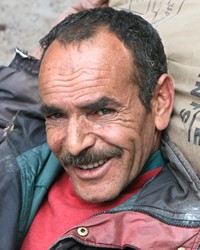Berber, Rif in France

Photo Source:
David Dennis - Flickr
Creative Commons
|
Send Joshua Project a map of this people group.
|
| People Name: | Berber, Rif |
| Country: | France |
| 10/40 Window: | No |
| Population: | 133,000 |
| World Population: | 1,941,000 |
| Primary Language: | Tarifit |
| Primary Religion: | Islam |
| Christian Adherents: | 0.20 % |
| Evangelicals: | 0.03 % |
| Scripture: | New Testament |
| Ministry Resources: | Yes |
| Jesus Film: | Yes |
| Audio Recordings: | Yes |
| People Cluster: | Berber-Rif |
| Affinity Bloc: | Arab World |
| Progress Level: |
|
Introduction / History
Berbers are divided by subgroups, determined either by language or region. For example, Rif or Riffian, refers to those from what is now western Morocco. Within the Rif Berbers are a number of subtribes. The term “Berber” was given to them during the days of the Roman Empire, and it meant, “barbarian.” The generic term that they prefer is Imazighen, meaning, "Free men."
Rif Berbers are from parts of Northwest Africa once controlled by France's colonial empire. France destroyed the ability of the people of the Rif region to make a living through handicrafts or agriculture, so they had to look elsewhere for work. The first ones to migrate to France came as soldiers and factory workers during World War I. When the war ended, many remained in France. Others arrived after World War II when there was a labor shortage in France. Most Rif Berbers came to France during these decades, whereas the other Berber subgroups were more likely to come in the latter decades of the 20th century.
As the number of immigrants in France increased, so did various kinds of problems with housing and unemployment. Initially, the immigrants were males who lived in low-standard hostels and worked at low-paying jobs such as construction, street cleaning, mining or heavy work in steel assembly.
What Are Their Lives Like?
Some Rif Berbers are merchants in France since there is much trade between their North African homeland and France. Many cab drivers in Paris are Rif Berbers. Other Berber groups have family-owned grocery and produce stores in urban France.
In the Rif Berber family, as many as three or four generations live together in one small apartment, sharing everything. The family structure is somewhat of an authoritarian democracy. While the father is responsible for controlling all household matters, he must obtain the agreement of the rest of the family as well. A Rif Berber wife has more authority than a woman from a different Berber subgroup.
Banishment from the family is considered the ultimate punishment. This is a major deterrent to those who might otherwise consider the claims of Jesus Christ.
The secular environment in France has left the Berbers, as well as other Muslim peoples, looking to their own communities. They do not want their children to grow up secularized, abandoning the Muslim religion.
What Are Their Beliefs?
The Rif Berbers are almost all Muslims, although their religious practices are based more on traditions and the decisions of the community rather than on the Koran, Islam's holy book. Rif society is organized around two main systems: Islam and the tribe. However, there are many differences between urban and rural societies, and this is especially true in a foreign culture like that of France. In urban areas, orthodox Islam prevails; whereas, in rural areas, ancient beliefs and customs are still intermingled with the Muslim faith.
What Are Their Needs?
Rif Berbers need the chance to put their identity in Jesus Christ and enjoy his blessings in this life and in the life to come. Someone needs to go to them with the life-changing gospel.
Prayer Points
Pray for a spiritual hunger among Rif Berbers that will lead them to the cross and the empty grave.
Pray for workers to go to the Rif and find persons of people who will welcome them into their communities with the gospel of peace.
Pray for Rif Berbers in France to put their faith and hope in Christ, paving the way for a Disciple Making Movement.